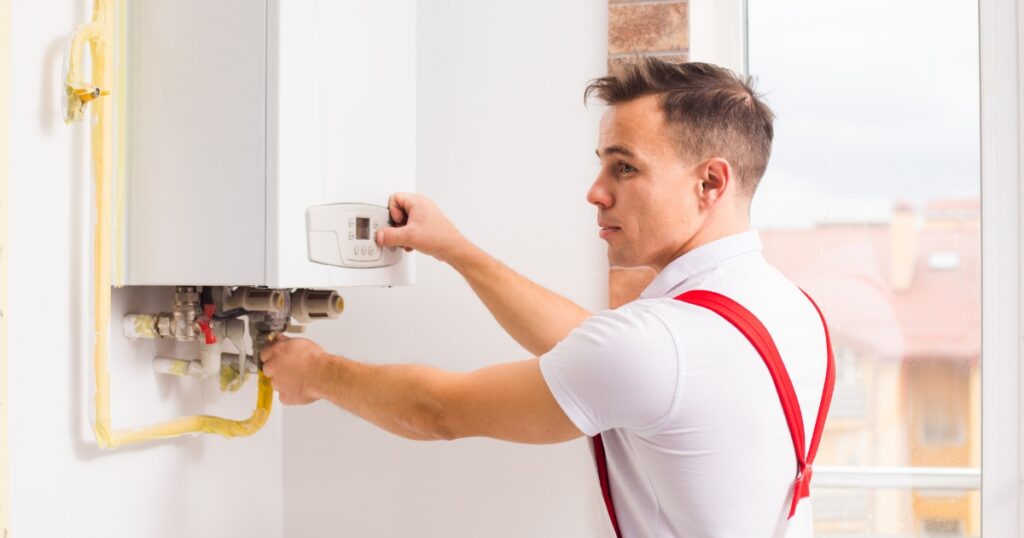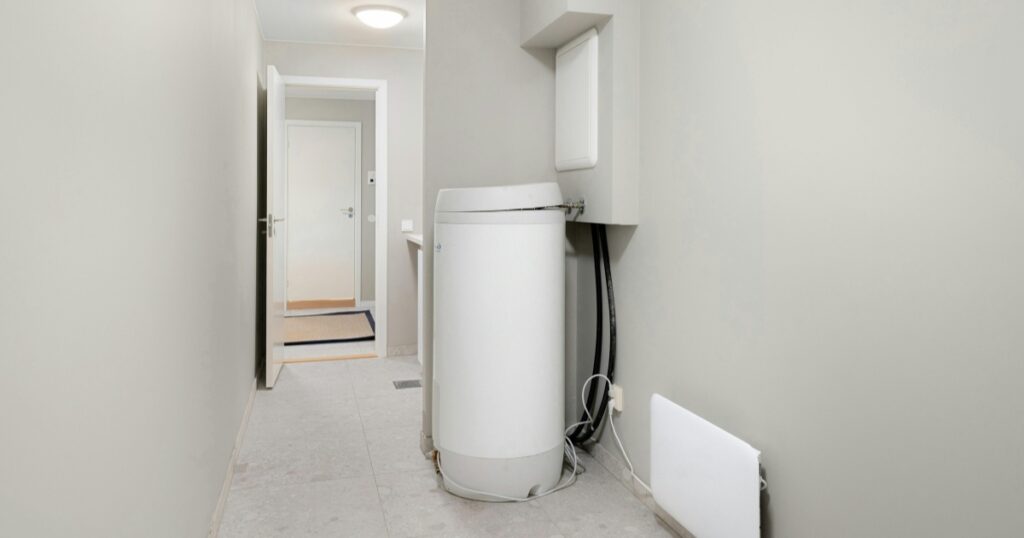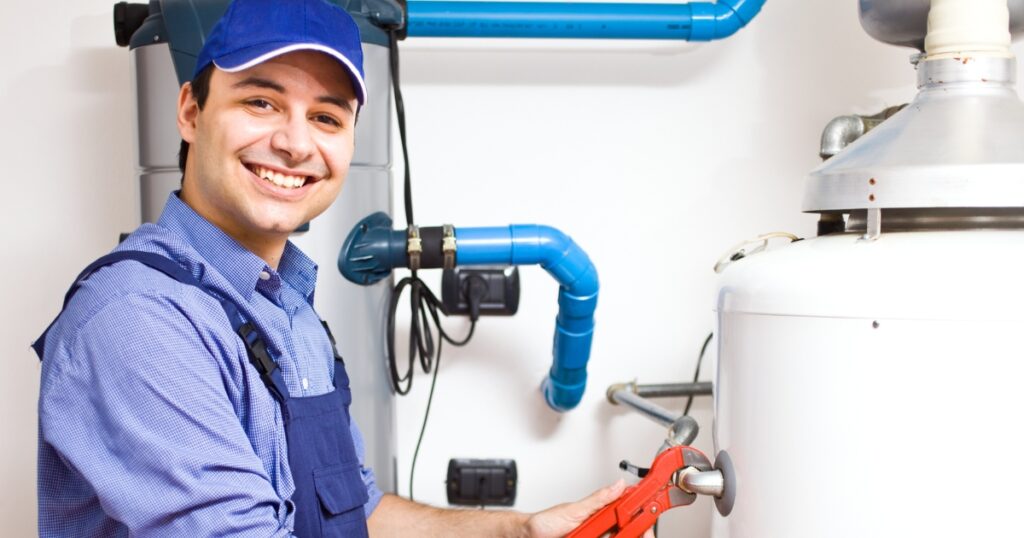Coping with a leaky hot water heater is enough to make anyone’s blood boil. It’s that all-too-common snag, with drips and drops that can send your bills sky-high and leave your comfy home feeling more like a wet weekend.
No worries though, this yarn’s going to give you the nuts and bolts of fixing up those niggling leaks – it’s easier than you might reckon! So stick around, grab a cuppa, and we’ll run through how to patch things up before you can say ‘no dramas’.
Key Takeaways
- Leaking hot water heaters can lead to high bills and home damage, including mould growth and structural harm, so it’s essential to address leaks swiftly.
- Regular checks for common issues like faulty pressure relief valves, damaged tanks or loose pipe fittings can prevent leaks in your hot water system.
- Always turn off the power and water supply before attempting any repairs on a leaking hot water heater to ensure safety.
- Upgrading to a more efficient hot water system can save money on utility bills and may increase your home’s value while providing better performance and safety features.
- If you’re unsure about fixing a leak yourself, call a professional plumber right away to avoid further damage or potential hazards.

Why Addressing Leaks in Hot Water Heaters is Important
Addressing leaks in hot water heaters is crucial because they can cause significant damage to your home and lead to high water bills. Additionally, leaks can also pose potential safety hazards if not dealt with promptly.
Can cause significant damage and high water bills
Leaks in hot water heaters often start small but can quickly become a big problem. If we ignore them, they can lead to severe damage to our homes. The continuous drip of water may seem harmless at first, yet over time it can destroy floors, subfloors, and walls.
Moisture from these leaks creates the perfect environment for mould and mildew to grow, which not only damages the structure but can also cause health issues.
High water bills catch many of us by surprise when there’s a leaking hot water system. Those tiny drips add up fast on our meters, leading to an increase in costs that none of us want to see on our next bill.
By fixing leaking hot water systems promptly, we save ourselves from financial headaches down the track as well as conserve precious water resources. It’s about managing hot water system leaks efficiently so that we keep our homes safe and avoid wasting money where we don’t need to.
This can lead to potential safety hazards
Addressing leaks in hot water heaters is crucial since they can lead to potential safety hazards. A leaking hot water system poses the risk of electrical malfunctions, as well as slips and falls due to wet surfaces.
Furthermore, if the leak is caused by a damaged tank or pressure relief valve, there’s a higher likelihood of scalding from excessively hot water. Therefore, prompt attention to any signs of leakage in your hot water system is essential for maintaining a safe home environment.
In addition to potential electrical and burn risks, leaks in hot water systems can also result in structural damage if left unattended. Timely intervention not only ensures safety but also helps avoid costly repairs down the line.
Steps to Take When You Notice a Leak in Your Hot Water System
When you notice a leak in your hot water system, don’t panic. Instead, identify the source of the leak and turn off the water and power supply before calling a professional plumber to fix the issue.
Don’t panic
If you notice a leak in your hot water system, don’t panic. Start by identifying the source of the leak and turning off the water and power supply to prevent further damage. It’s important to call a professional plumber immediately to assess and address the issue because leaks can worsen over time if left unattended.
Remember, taking prompt action is crucial when dealing with leaking hot water heaters as it helps prevent potential safety hazards and costly damage to your property.
Identify the source of the leak
When a hot water system is leaking, the first step is to identify the source of the leak. This can be done by checking for visible signs of water around the tank, inspecting pipe fittings for any looseness or cracks, and examining the pressure relief valve for any drips or leaks.
It’s important to pinpoint the exact location of the leak to effectively address it and prevent further damage or safety hazards.
Turning off the water supply is an important initial step in addressing a leaking hot water system. Additionally, calling a professional plumber if you’re unsure about locating or fixing the source of the leak will help ensure that your hot water heater issues are resolved promptly and correctly.
Turn off the water and power supply
To prevent further damage and safety hazards, immediately turn off the water and power supply to the leaking hot water system. This step is crucial in halting any potential worsening of the leak and reducing the risk of electrical malfunctions or water damage.
By taking this action promptly, you can mitigate potential safety risks associated with a leaking hot water heater while also preventing additional expenses from increased energy usage or extensive repairs.
Once the water and power supply are turned off, homeowners can proceed with identifying the source of the leak and seeking professional assistance to address it effectively. Regularly checking for leaks and acting swiftly when they occur enables homeowners to maintain a safe and efficient hot water system without unnecessary complications or costs.
Call a professional plumber
After turning off the water and power supply, it is crucial to call a professional plumber as soon as possible when dealing with a leaking hot water system. Professional plumbers have the expertise and experience to accurately assess the situation and carry out necessary repairs or replacements.
Due to the potential safety hazards associated with addressing hot water heater leaks, it’s imperative to seek assistance from qualified professionals who can ensure that the issue is resolved effectively and safely.
Furthermore, calling a professional plumber promptly can prevent further damage caused by delaying repairs. Plumbers are equipped with the right tools and knowledge to identify the root cause of the leak, whether it’s due to faulty pressure relief valves, damaged tanks, or loose pipe fittings.
Common Causes of Leaking Hot Water Systems
Faulty pressure relief valves, damaged tanks, and loose pipe fittings are some of the common causes of leaking hot water systems. Want to know how to troubleshoot and fix these issues?
Faulty pressure relief valve
A common cause of a hot water system leaking is a faulty pressure relief valve. This vital component is designed to release excess pressure that builds up inside the tank, but when it malfunctions, it can result in leaks.

Identifying and promptly repairing or replacing a faulty pressure relief valve is crucial in preventing further damage and potential safety hazards.
Regular maintenance and inspection of the pressure relief valve are essential to ensure it functions correctly. If you notice any signs of leakage around this area, calling a professional plumber immediately to assess and replace the faulty valve can prevent more significant issues down the line.
Damaged tank
After addressing a faulty pressure relief valve, the next common cause of a leaking hot water system is a damaged tank. When the tank is compromised, it can lead to significant leakage and potential safety hazards.
It’s important to note that old age or wear and tear over time can contribute to tank damage, making regular maintenance and inspection crucial for preventing leaks. Identifying any signs of corrosion or physical damage in the tank is essential for prompt repairs or replacement.
In addition, ensuring that loose pipe fittings do not place added stress on the tank structure will help prevent future damage. A professional plumber should be consulted at the first sign of a damaged hot water heater tank to assess if repairs are feasible or if a full replacement is necessary.
Loose pipe fittings
When dealing with a leaking hot water system, it’s essential to consider loose pipe fittings as a potential cause. Over time, the connections between pipes and fittings can loosen due to temperature changes and general wear and tear.
Regular maintenance checks are recommended to ensure that all fittings are secure, preventing any leaks from occurring. Identifying and addressing loose pipe fittings promptly can significantly reduce the risk of water damage and potential safety hazards.
Regularly inspecting and tightening loose pipe fittings is an important part of maintaining your hot water system, helping to prevent leaks that could lead to costly damage or dangerous situations.
Tips for Fixing a Leaking Hot Water System
When addressing a leaking hot water system, it’s important to first address any issues with the heating element gasket, replace faulty parts and always remember to turn off the water and power supply before attempting any repairs.
These tips can help prevent further damage and potential safety hazards.
Addressing issues with the heating element gasket
When addressing issues with the heating element gasket, it is important to first turn off the power and water supply to the hot water system. This will ensure safety while inspecting and fixing any problems with the gasket.
Once this is done, a professional plumber can be called in to assess and replace the faulty gasket if necessary. It’s crucial to address this issue promptly as a damaged heating element gasket can lead to leaks, inefficiency, and potential safety hazards.
Moving on from addressing issues with the heating element gasket, let’s explore tips for replacing faulty parts in a leaking hot water system.
Replacing faulty parts
After addressing issues with the heating element gasket, the next step in fixing a leaking hot water system is replacing faulty parts. This typically involves inspecting components such as the pressure relief valve, tank, and pipe fittings to identify any damage or wear that may be causing the leak.
If any of these parts are found to be defective or malfunctioning, they should be promptly replaced to prevent further leakage and potential safety hazards.
Replacing faulty parts in a hot water system is crucial for maintaining its efficiency and safety. Whether it’s a damaged pressure relief valve or loose pipe fittings, timely replacement of these components can help prevent costly water damage and ensure that your hot water heater operates smoothly without any leaks.
Turning off the water and power supply before attempting any repairs
To prevent accidents and further damage, it’s crucial to turn off the water and power supply when addressing a hot water system leak. This simple step can help avoid potential safety hazards and reduce the risk of extensive damage.
By cutting off the water and power source, you can ensure a safer environment for inspecting and repairing your hot water heater.
Once you’ve safely turned off the water and power supply, it’s time to call a professional plumber to assess and fix the issue at hand. Remember that dealing with plumbing issues without professional assistance can lead to more complex problems down the line.
To Repair or Replace a Leaking Hot Water System?
When it comes to deciding whether to repair or replace a leaking hot water system, there are several factors to consider. From the cost-effective options to the benefits of upgrading to a more efficient hot water system, it’s important to weigh your choices carefully before making a decision.
Factors to consider
When deciding whether to repair or replace a leaking hot water system, we need to consider several factors. The age of the hot water heater is crucial since older units may be more prone to leaks and could require frequent repairs.

Additionally, the extent of damage and the cost of repairs versus replacement are important considerations. If multiple parts are failing or if the tank itself is damaged, it may be more cost-effective in the long run to invest in a new, more efficient hot water system that will reduce future maintenance costs.
Upgrading to a newer model can also lead to improved energy efficiency, ultimately reducing monthly utility bills and providing better performance.
In addition, homeowners should weigh the benefits of upgrading to a modern hot water system with enhanced safety features and improved technology against repairing an older unit which may require ongoing maintenance.
Cost-effective options
When dealing with a leaking hot water system, it’s essential to consider cost-effective options. Here are some practical steps to take when addressing a leaking hot water system:
- Regular maintenance can extend the lifespan of your hot water system and prevent costly leaks.
- Upgrading to a more efficient hot water system can save money in the long run and reduce the likelihood of future leaks.
- Promptly repairing small leaks can prevent them from turning into larger, more expensive problems in the future.
- Consulting with a professional plumber can help identify cost-effective repair or replacement options tailored to your specific situation.
- Consider investing in a quality water heater that is known for its durability and reliability, reducing the need for frequent repairs.
Benefits of upgrading to a more efficient hot water system
Upgrading to a more efficient hot water system can result in significant cost savings over time. A newer, energy-efficient model can reduce your monthly utility bills by using less energy to heat the water.
This not only benefits your wallet but also contributes to reducing your household’s carbon footprint. Additionally, modern hot water systems often come with improved safety features and better insulation, providing peace of mind and longevity for your investment.
Another benefit of upgrading to a more efficient hot water system is the potential increase in property value. Homebuyers are increasingly seeking eco-friendly and energy-efficient features, including high-efficiency hot water systems.
Fast and Effective Hot Water Repairs in Your Area!
In conclusion, addressing leaks in hot water heaters is crucial for preventing damage and potential safety hazards. Identifying the source of the leak and taking prompt action, such as turning off the water supply and calling a professional plumber, is essential.
Regular maintenance and timely repairs can help avoid costly damage and ensure efficient hot water systems. Taking proactive steps to address leaks in hot water heaters can contribute to a safer, more reliable home environment.
Dealing with leaks in your hot water heater? Don’t let water damage dampen your day. At Hot Water Repairs Today, we’re experts in fixing leaks and ensuring your hot water system runs smoothly. Whether it’s a small drip or a major leak, our team is ready to tackle the problem head-on. Don’t wait until it’s too late. Contact us now to schedule a repair and prevent further damage to your home.






